by Jennifer Ferrero
Ensuring genetically pure seed with a varietal identity is mission-critical for the future of crops in Eastern Washington. That’s the take on it from the Washington State Crop Improvement Association (WSCIA, since 1951), which is the group that manages the certification of small grains in Washington. But at the end of the day, the producer works the land and grows the crop, so why is using certified seed the best choice? For growers, pure seed means guaranteed germination, “so growers can maximize yield potential through the use of high-quality certified seed,” says Aaron Jeschke. It also means the best possible product is sold to feed people and livestock.
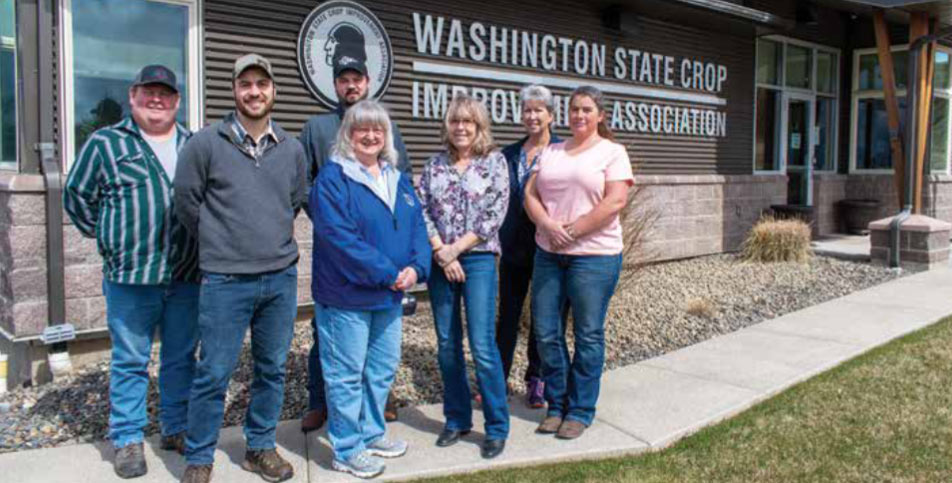
Aaron Jeschke is WSCIA’s manager. He joined the group in the fall of 2021. “WSCIA acts as seed stewards ensuring certified seed meets genetic purity, physical purity, and germination standards,” he said.
Jeschke, a Washington State University (WSU) graduate, has an agriculture and criminal justice education. While this is an atypical education for someone in his role, Jeschke says the legal side of his education in criminal justice is invaluable, “because I work with many kinds of contracts and the Washington Administrative Code that dictates the requirements of certified seed production.”
Seed certification is done for many crops. WSCIA certifies small grains (including wheat and barley), chickpeas, field peas, lentils, soybeans, buckwheat, millet, sorghum, and forest reproductive material. Additionally, certified seeds are classified into three main categories (classes) for each released variety: foundation, registered, and certified. A distinctive tag is attached to each bag to denote the seed class. Each shipment of certified seed should be tagged or accompanied by a bulk certificate.
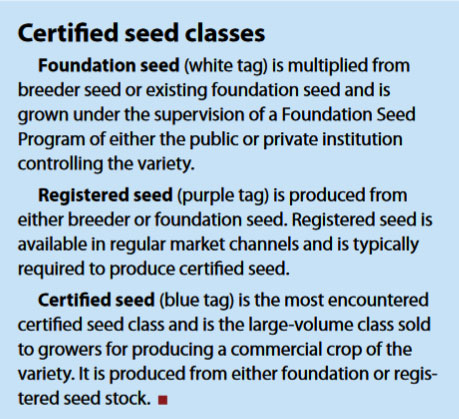 For Jeremy Tamsen and WSU, seed certification is a “key part of the production chain for any qualifying crop. Not all crops have seed certifications or standards.” He noted that grasses and small grains are susceptible to contamination. “Without certified seed, we don’t know if it is high purity, weed-free, and meets germination standards. It is vital for us. We want to develop and test the top-yielding varieties throughout the research on small grains. When we can offer seed to farmers, it must meet the quality we selected out of thousands of plants. Without certification, we don’t know what you are getting.”
For Jeremy Tamsen and WSU, seed certification is a “key part of the production chain for any qualifying crop. Not all crops have seed certifications or standards.” He noted that grasses and small grains are susceptible to contamination. “Without certified seed, we don’t know if it is high purity, weed-free, and meets germination standards. It is vital for us. We want to develop and test the top-yielding varieties throughout the research on small grains. When we can offer seed to farmers, it must meet the quality we selected out of thousands of plants. Without certification, we don’t know what you are getting.”
Tamsen is the director of innovation and commercialization for WSU’s College of Agricultural, Human, and Natural 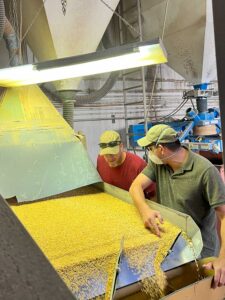 Resource Sciences. His role includes working with staff researchers and students on their inventions to help them bring products to market, including new plant varieties. He advises on patents, licensing, and varieties covered by Plant Variety Protection (PVP) certificates, and because of that, he says a law degree in this role is helpful. His stakeholders also include third-party businesses, farmers, and entrepreneurs, and people in the university conducting research. Tamsen had worked in a similar role at the University of Idaho for seven years before joining WSU a year ago.
Resource Sciences. His role includes working with staff researchers and students on their inventions to help them bring products to market, including new plant varieties. He advises on patents, licensing, and varieties covered by Plant Variety Protection (PVP) certificates, and because of that, he says a law degree in this role is helpful. His stakeholders also include third-party businesses, farmers, and entrepreneurs, and people in the university conducting research. Tamsen had worked in a similar role at the University of Idaho for seven years before joining WSU a year ago.
Jeschke also feels that seed certification is essential, as many varieties are protected by PVP, licenses, or patents and are required to be sold only as a class of certified seed. He explains that each seed production field must meet the land history requirement, and WSCIA must have proper seed stock documents with the field inspection application. Before harvest, WSCIA teams inspect each field to look for contaminants such as noxious weeds, off-types, and other small grains contamination such as rye or triticale. Once the seed is harvested, it is conditioned/cleaned and sampled. The Washington State Department of Agriculture conducts the lab analyses for purity and germination of the seed.
Jeschke has a long history in the Pacific Northwest and experienced farm life as a kid when visiting his grandfather in Genesee, Idaho. He said returning to Pullman in 2021 was “like coming home” to him. His main stake-holders include the board of directors for WSCIA and
seed dealers. WSCIA is also a part of the Association of Official Seed Certifying Agencies (AOSCA.org).
Tamsen said, “Washington raises over 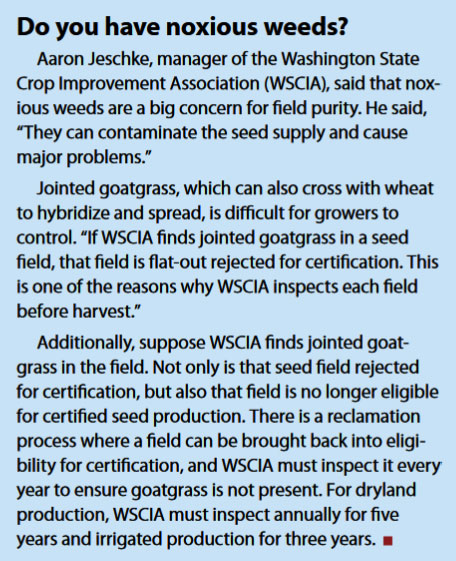 300 different commodities, from timber to apples to wheat, and WSU supports every single one of those industries.” He said WSU is involved in finding solutions for the industry through research. Therefore, weather or crop-related issues fall into the purview of the college to create solutions or new cultivations.
300 different commodities, from timber to apples to wheat, and WSU supports every single one of those industries.” He said WSU is involved in finding solutions for the industry through research. Therefore, weather or crop-related issues fall into the purview of the college to create solutions or new cultivations.
Tamsen summarized, “Buying uncertified seed is like buying ‘mystery meat’ and feeding it to your entire family raw — you don’t know what you’ll get. When your entire business is based on the crop you’re growing, you don’t want mystery meat in your ground.”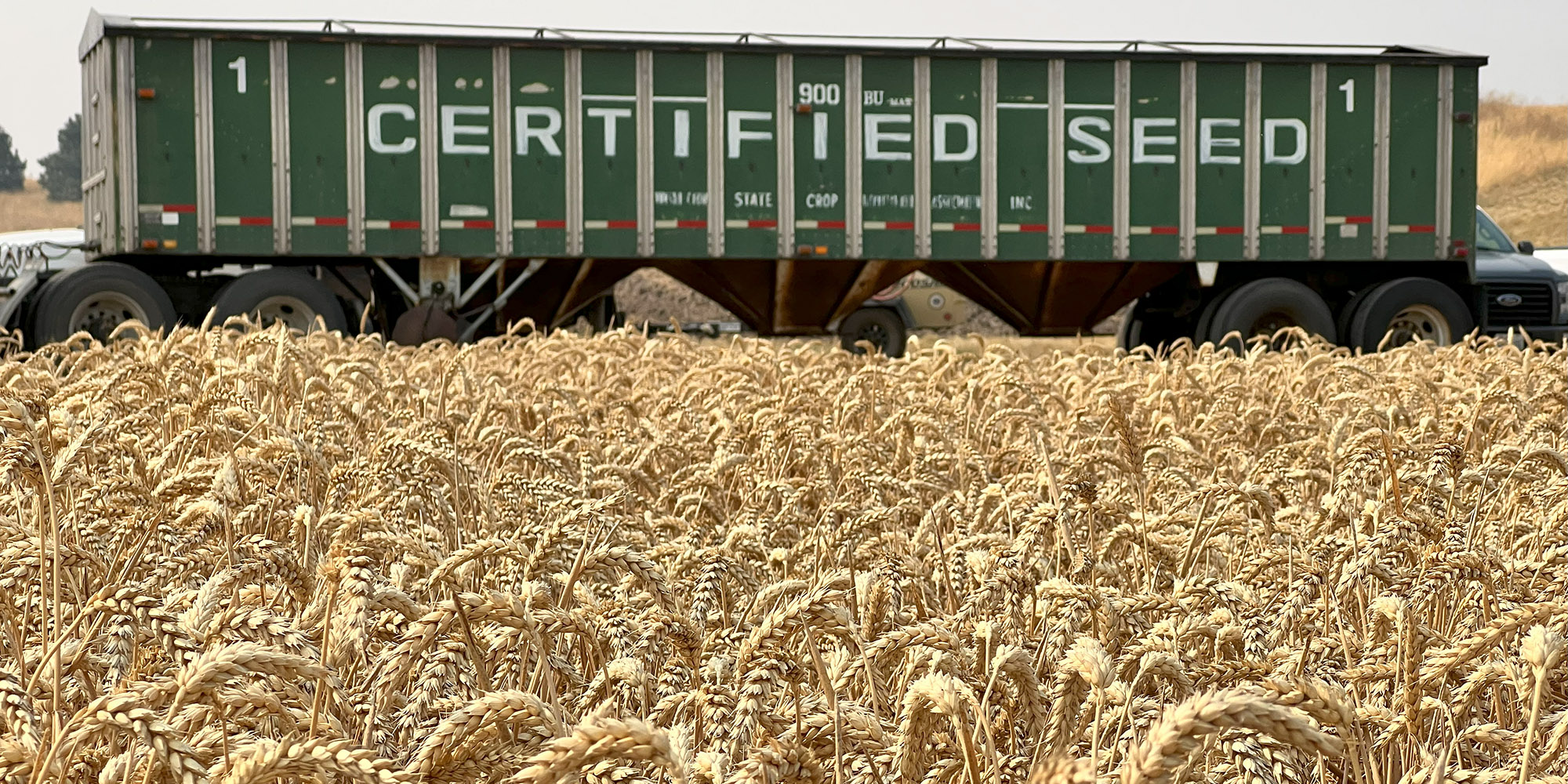
For more on certified seed check out: A foundation to grow on, by Trista Crossley, editor of Wheat Life Magazine.
This article originally appeared in the July 2023 issue of Wheat Life Magazine.
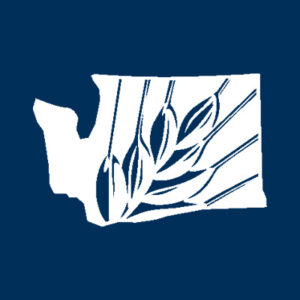
Jennifer Ferrero
Jennifer Ferrero is contributing writer for Wheat Life Magazine.
